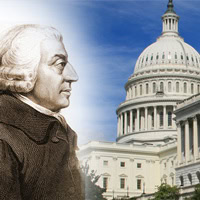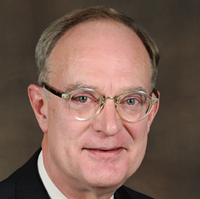What is the relationship between capitalism and democracy? Does economic liberty serve and strengthen political freedom, or does the pursuit of self-interest undermine the moral qualities necessary for self-government? Does modern democracy ensure a free and flourishing economy, or do the egalitarian ideals of democratic man require limitations on market competition and lead to an ever-expanding welfare state?

In the modern age, capitalism and democracy emerged together as two ideas of how human beings should govern themselves. It is no coincidence of history that Adam Smith’s classic The Wealth of Nations, the foundational text for the modern idea of the free economy, was published in the same year (1776) that a new democracy was founded in America. This vision of the good society was dedicated to protecting the rights of man to choose one’s leaders and to pursue one’s economic interests. The role of government was to ensure that all citizens could exercise these self-evident rights and liberties forever and always.
From the beginning, democratic and capitalist societies have inspired great moral and political opposition. Modern welfare-state democracies have chosen to set significant limits on the free economy and to redistribute wealth in the name of equality. We have also seen many democratic societies whose origins were not capitalist at all—like modern Israel; and we have seen societies attempting to combine the wealth that only capitalism creates with autocratic governments that no friend of liberty could ever condone.
This institute aims to explore the fundamental questions of political economy, by drawing upon classic texts of modern economic and democratic thought, and then looking at key modern debates and policy dilemmas now facing the advanced democracies of the world.
Week One will be led by Yuval Levin, founding editor of National Affairs and one of the leading public intellectuals in the U.S. Through the study of Aristotle and John Locke, Adam Smith and Karl Marx, we will explore the relationship between the pursuit of wealth and the quest for the virtuous society.
Week Two will be led by Christopher DeMuth, former president of the American Enterprise Institute and Distinguished Fellow at the Hudson Institute. Turning to modern thinkers who help us understand the relationship between democratic politics, public policy, and economic prosperity, we will study Hayek, Shumpeter, Irving Kristol, and selections from Thomas Piketty’s Capital in the Twenty-First Century. With a study of the 2008 Financial Crisis, we conclude by asking whether the good society requires a free economy, and whether a society committed to liberty can also sustain a virtuous citizenry and a just social order.
This institute will take place at the Tikvah Center in the heart of New York City (165 E. 56th Street). The required sessions take place in the mornings (9:15 – 12:30), with optional lectures and events offered in the afternoon as well.
This institute is offered in conjunction with the Hertog Foundation: hertogfoundation.org.

 Christopher DeMuth is a Distinguished Fellow at the Hudson Institute in Washington, D.C. He was President of the American Enterprise Institute for Public Policy Research from 1986–2008 and D.C. Searle Senior Fellow at AEI from 2008–2011. He served as Staff Assistant to President Richard M. Nixon in 1969-1970, working first for Daniel P. Moynihan (then Assistant to the President for…
Christopher DeMuth is a Distinguished Fellow at the Hudson Institute in Washington, D.C. He was President of the American Enterprise Institute for Public Policy Research from 1986–2008 and D.C. Searle Senior Fellow at AEI from 2008–2011. He served as Staff Assistant to President Richard M. Nixon in 1969-1970, working first for Daniel P. Moynihan (then Assistant to the President for…